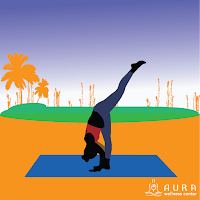By Kimaya Singh
Just two decades ago, the only option to become a certified
yoga teacher was to spend thousands of dollars in an ashram to study with your guru. You may have traveled thousands of miles for this privilege and have to
live in another country for years during this process.
In truth, you would live with fellow students and other yoga
lovers for years. There was a full curriculum packed with the art's history,
lessons on the body's physiology, etc. The countless hours spent receiving
critiques from a guru with years of experience were priceless. Watching them
walk through the room and not just seeing and hearing, but feeling how they
interacted with all of the students was a great eperience. That was the learning aspect
of yoga before the Internet - feeling your way through the movements and the
interactions with others. As a student getting that in-the-moment feedback from
your teacher was important because we did not have the information highway to
exchange ideas, photos, videos, and Email, by broadband.
As with all things, change comes. In a world full of information
and solutions, yoga teacher education could never remain in the 20th
century. We have moved beyond the telegraph and exchange ideas in real time
with streaming video, diagrams, and rich conversations. Your job and family
obligations may not allow for working side by side with your guru for five
years. Now, crucial information is just a video away. With the click of a link
online or by popping a DVD in, anyone can learn how to work around
contraindications or help a student with high blood pressure.
Yoga, like all things has changed because of a vast information
exchange. Many yoga instructors have confirmed that in order to stay relevant
in the field, they must learn and participate in continuing education and video
training has now become a much less expensive alternative for teachers who need
to keep their studios open, while they remain current in their training.
This is not traditional, but maybe teacher education should be
looked at from a different position. Video training is the perfect solution to
some common challenges in the field. Practical exams, essays, and written exams
are not always a part of traditional training. In some cases, a fly on the wall
could receive a diploma just by paying thousands of dollars on an exotic
vacation.
My point being: You cannot play around with online education.
Examinations are an accurate measurement of the learning process. On the other
hand, you can sleep right through an exotic vacation, hang out with teachers
and students by the beach, and go home with a diploma that states you were
awake, paying attention, and actually learned something.
To this point, videos can offer major benefits to experienced and
future yoga teachers alike. Watching a video allows students to learn when and
where it is most convenient to them. It also offers the chance to revisit
lessons as many or as few times as needed to perfect, allowing for a more solid
foundation and consistency. Seasoned teachers would probably have to agree that
continuing their education is always a priority and with a tool like videos, continuing education get a lot simpler.
Either
way, online and video learning are here to stay and are exactly what today’s
teachers ordered.
©
Copyright 2016 – Aura Wellness Center – Publications Division
To see
find out more about yoga or to see our selection of affordable courses,
including our online hatha yoga teacher training intensive courses, please use
the yoga resources on the right side of this page.
If you are
a teacher, yoga studio manager, blogger, e-zine, or website publisher, and are
in need of quality content, please feel free to use my blog entries (articles).
Please be sure to reprint each article, as is. Namaste!

2 comments:
Videos can offer major benefits to experienced and future yoga teachers alike. Watching a video allows students to learn when and where it is most convenient to them. Thanks for posting this informative article.
Video training has now become a much less expensive alternative for teachers who need to keep their studios open, while they remain current in their training. Thanks for sharing this type of useful article.
Post a Comment